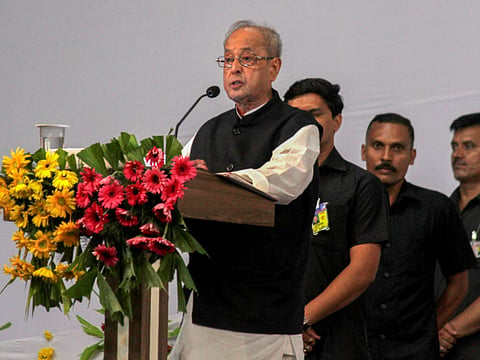Will the hotheads in India listen to Pranab’s message?
The RSS outreach is welcome but it is too early to guage the impact on Hindu-right

It was an evening of pious homilies at the Rashtriya Swayamsevak Sangh (RSS) headquarters in Nagpur where former Indian president, and now a citizen, Pranab Mukherjee was the guest of honour at a valedictory function.
While he dwelt on how pluralism and tolerance constituted the “soul” of India, the RSS Sarsanghchalak Mohan Bhagwat expounded on the organisation’s vision which extended well beyond the Hindu samaj (society) and encompassing all the children of Bharat Mata (Mother India).
There was no paraya (outsider) in his view, nor any dushman (enemy). Observers noted that there was no mention of a Hindu rashtra (nation), the leitmotif of the RSS, in Bhagwat’s speech. Was this a concession to a diehard former Congressman Mukherjee’s secular sensitivities? If this is a change of heart, it will mark a seminal shift in the outlook of the 93-year-old organisation and carries the potential of political and social upheaval.
Arguably, Bhagwat’s claim about Mother India’s parentage of all Indians, irrespective of caste or creed, is on a par with Narendra Modi’s Sabka saath, sabka vikas (Together for all, development for all) mantra. It is also the essence of the multicultural, multireligious secular concept, which is routinely derided as “sickular” by the saffron trolls.
Just as the agenda of development for all hasn’t led to any marked reduction in the “darkness, fear and mistrust” among minorities, as Mukherjee said, it has to be seen whether Bhagwat’s outreach will stop the Hindutva activists from mocking Muslims as Babur ki aulad (children of the Mughal emperor, Babur) or accusing Christian missionaries of relentless conversions.
The difficulty of changing the attitudes of the average RSS supporter can be gauged from the way a saffron television commentator latched on to Mukherjee’s reference to Muslim “invaders” and British colonisers. He used it to show how the former president’s views differed from the tolerance of the secularists in associating Muslims with biryani and the British with cakes.
It might take time for the Hindu-right and the secularists to find common ground, but the RSS initiative to invite a person from the opposing camp and Pranab’s acceptance of the invitation bode well for the country.
It will be a great relief if last Thursday’s interaction in Nagpur leads to a reduction in polarisation. The process might be very long considering that for decades the two lines of thought — one of a composite culture (of Hindus, Muslims and others) and the other of cultural nationalism (one people, one nation, one culture) — have battled one another.
But the endeavour towards a consensus will be worthwhile if it dissuades an MP like Vinay Katiyar of the Bharatiya Janata Party (BJP) from saying that Muslims have no right to live in India or for a suspect in custody to justify the journalist Gauri Lankesh’s murder because she was anti-Hindu.
The test of the Nagpur bonhomie will be its impact on the Hindutva hotheads. Although the RSS is the paterfamilias of the saffron brotherhood, organisations like the Vishwa Hindu Parishad (VHP) and the Bajrang Dal (which are a part of the Sangh Parivar), and Hindu Mahasabha are ardent votaries of a Hindu ‘rashtra’ where the minorities have to live as second-class citizens. So, it will take more than two speeches in Nagpur to save the pluralist “soul” of India.
Since fundamentalism begets fundamentalism, the stridency of the Hindu version can encourage the bigots among Muslims or the Khalistanis among Sikhs to up the ante.
Besides that, the Left-liberals will interpret a toning down of the saffron rhetoric as a victory for the secular camp and a defeat for the Parivar. The Congress is already gloating that Mukherjee held up the “mirror of truth” to the RSS although the party was initially nervous about what their old stalwart would say.
Now that Mukherjee’s history lessons were in line with the Congress version, the party has heaved a sigh of relief. But the battle of wits will continue.
— IANS
Amulya Ganguli is a political analyst in India


